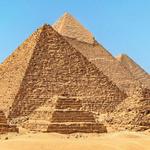
Things To Do
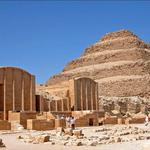
Saqqarah
Lying 12.5 miles/20km south of Giza, is the site of the earliest known Egyptian pyramids, at Saqqara. Saqqara was the ancient royal capital, of Memphis. This is Egypt’s largest archaeological site and we wholeheartedly recommend visiting. If you want to see more about one of the most amazing discoveries in recent years, check out the Secrets of the Saqqara Tomb on Netflix. What to see: a) Step Pyramid of Djoser: The world's oldest pyramid, built by Djoser, the first king of the third dynasty b) Pyramid of Unas: The first pyramid to be decorated with funerary inscriptions called the “Pyramid Texts” c) Pyramid of Teti: Contains some of the famous Pyramid Texts d) Tomb of Kagemni: A notable tomb in Saqqara e) Mastaba of Ti: A tomb with reliefs of daily life f) Tomb of Horemheb: A finely decorated tomb of a general who later became king
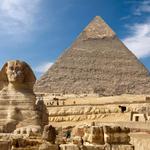
Great Sphinx of Giza
The Great Sphinx of Giza is a giant limestone statue (240 feet (73 m) from paw to tail) with the body of a lion and the head of a human, believed to be the head of Khafre, the builder of the second of Giza’s pyramids. Despite its name in Arabic, which translates as “The Father of Dread”, the sphinx of Egyptian mythology is a symbol of strength, intelligence and benevolence. Most historians and archaeologists agree that the Sphinx was probably built around 2500 BCE as part of Khafre’s funerary complex – probably as a guardian of his tomb – and that the sphinx’s face is therefore most likely a likeness of the 4th Dynasty Pharaoh.
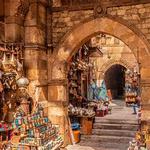
Khan el-Khalili
Cairo’s famous medieval souq, Khan El Khalili, is a rabbit’s warren of densely packed alleyways, mosques, Ottoman-era mansions and endless souvenir shopping. PSA: Bring cash and all your bargaining skills! Hours: 9 am - 12 am
The National Museum of Egyptian Civilization
Sculpture, pottery & metalware charting millennia of Egyptian civilization, plus a hall of mummies.
The Egyptian Museum in Cairo
One of the most famous museums in the world, and an absolute treasure trove of ancient artifacts! More than 120,000 items are on display – including the most famous of all, Tutankhamun’s burial treasures. The museum gets very busy, especially once the tour groups arrive. We therefore recommend arriving early to beat the crowds. This is also one of the destinations for which we strongly encourage you to consider getting a guide.
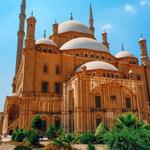
Cairo Citadel
The Saladin Citadel – also known as Cairo Citadel – sits on top of a hill overlooking old Cairo. The citadel was built for protection against the Crusaders between 1176 and 1183, and was the seat of the Egyptian government until the 19thC. The present-day Citadel complex encompasses mosques, museums and the Al Gawhara Palace. It offers super views of the city below – and on a clear day, out to the Pyramids at Giza.
Mosque of Muhammad Ali
Commissioned by Muhammad Ali Pasha between 1830 and 1848, it was a declaration to his Ottoman overlords of Egypt’s newfound independence. Mohammad Ali – known as the “father of modern Egypt,” – was a reformer who wanted to distance himself from the influence of six centuries of Mamluk rule. At the height of his rule, he ruled over Egypt, Sudan, Hejaz, Najd, the Levant, Crete and parts of Greece. The interior of the mosque is beautiful. The high domed ceiling is hung with low hanging lanterns which reflect on the polished floor. There are 6 medallions around the dome that include the names of God, the Prophet Mohamed and the four caliphs, or the “rightly guided” rulers who reigned right after Mohamed (Abou Bakr, Omar, Othman, and Ali). The main prayer space can hold up to 6,500 worshippers. The mosque is also known as the Alabaster Mosque given the marble coated first floor.
The Hanging Church
It is one of the oldest churches in Egypt, and it’s the most famous Coptic Christian church in Cairo. Built on top of the southern gate of the old Roman fortress, palm tree logs and layers of stone were constructed above the ruins and used as the church's foundation, “suspending” it between the two towers.
Mamsha Ahl Masr
We highly recommend taking a relaxing boat ride on the Nile to see Cairo's skyline from a different perspective for lunch or dinner. We recommend going to Mamsha Ahl Masr.
